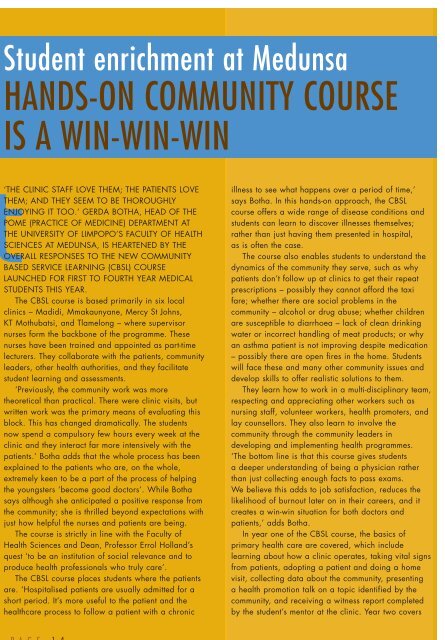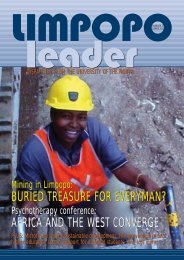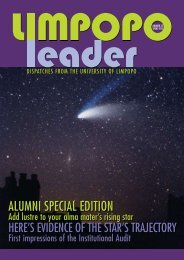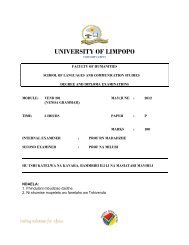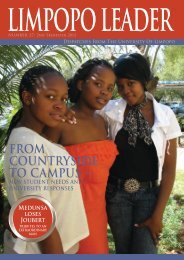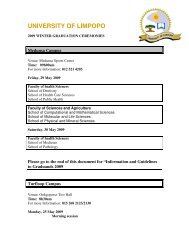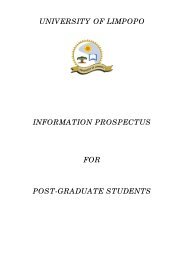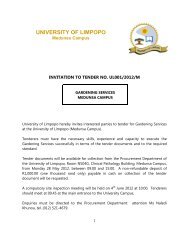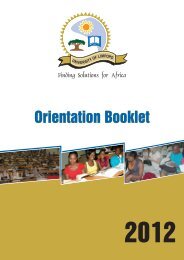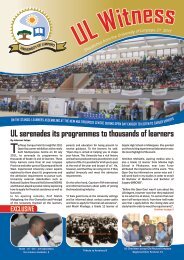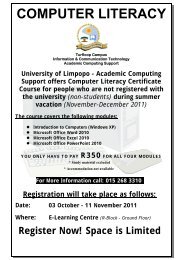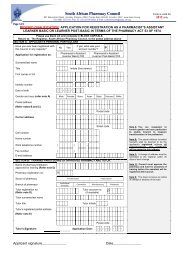MEDUNSA UPGRADE - University of Limpopo
MEDUNSA UPGRADE - University of Limpopo
MEDUNSA UPGRADE - University of Limpopo
Create successful ePaper yourself
Turn your PDF publications into a flip-book with our unique Google optimized e-Paper software.
Student enrichment at Medunsa<br />
HANDS-ON COMMUNITY COURSE<br />
IS A WIN-WIN-WIN<br />
t‘THE CLINIC STAFF LOVE THEM; THE PATIENTS LOVE<br />
THEM; AND THEY SEEM TO BE THOROUGHLY<br />
ENJOYING IT TOO.’ GERDA BOTHA, HEAD OF THE<br />
POME (PRACTICE OF MEDICINE) DEPARTMENT AT<br />
THE UNIVERSITY OF LIMPOPO’S FACULTY OF HEALTH<br />
SCIENCES AT <strong>MEDUNSA</strong>, IS HEARTENED BY THE<br />
OVERALL RESPONSES TO THE NEW COMMUNITY<br />
BASED SERVICE LEARNING (CBSL) COURSE<br />
LAUNCHED FOR FIRST TO FOURTH YEAR MEDICAL<br />
STUDENTS THIS YEAR.<br />
The CBSL course is based primarily in six local<br />
clinics – Madidi, Mmakaunyane, Mercy St Johns,<br />
KT Mothubatsi, and Tlamelong – where supervisor<br />
nurses form the backbone <strong>of</strong> the programme. These<br />
nurses have been trained and appointed as part-time<br />
lecturers. They collaborate with the patients, community<br />
leaders, other health authorities, and they facilitate<br />
student learning and assessments.<br />
‘Previously, the community work was more<br />
theoretical than practical. There were clinic visits, but<br />
written work was the primary means <strong>of</strong> evaluating this<br />
block. This has changed dramatically. The students<br />
now spend a compulsory few hours every week at the<br />
clinic and they interact far more intensively with the<br />
patients.’ Botha adds that the whole process has been<br />
explained to the patients who are, on the whole,<br />
extremely keen to be a part <strong>of</strong> the process <strong>of</strong> helping<br />
the youngsters ‘become good doctors’. While Botha<br />
says although she anticipated a positive response from<br />
the community; she is thrilled beyond expectations with<br />
just how helpful the nurses and patients are being.<br />
The course is strictly in line with the Faculty <strong>of</strong><br />
Health Sciences and Dean, Pr<strong>of</strong>essor Errol Holland’s<br />
quest ‘to be an institution <strong>of</strong> social relevance and to<br />
produce health pr<strong>of</strong>essionals who truly care’.<br />
The CBSL course places students where the patients<br />
are. ‘Hospitalised patients are usually admitted for a<br />
short period. It’s more useful to the patient and the<br />
healthcare process to follow a patient with a chronic<br />
P A G E 1 4<br />
illness to see what happens over a period <strong>of</strong> time,’<br />
says Botha. In this hands-on approach, the CBSL<br />
course <strong>of</strong>fers a wide range <strong>of</strong> disease conditions and<br />
students can learn to discover illnesses themselves;<br />
rather than just having them presented in hospital,<br />
as is <strong>of</strong>ten the case.<br />
The course also enables students to understand the<br />
dynamics <strong>of</strong> the community they serve, such as why<br />
patients don’t follow up at clinics to get their repeat<br />
prescriptions – possibly they cannot afford the taxi<br />
fare; whether there are social problems in the<br />
community – alcohol or drug abuse; whether children<br />
are susceptible to diarrhoea – lack <strong>of</strong> clean drinking<br />
water or incorrect handling <strong>of</strong> meat products; or why<br />
an asthma patient is not improving despite medication<br />
– possibly there are open fires in the home. Students<br />
will face these and many other community issues and<br />
develop skills to <strong>of</strong>fer realistic solutions to them.<br />
They learn how to work in a multi-disciplinary team,<br />
respecting and appreciating other workers such as<br />
nursing staff, volunteer workers, health promoters, and<br />
lay counsellors. They also learn to involve the<br />
community through the community leaders in<br />
developing and implementing health programmes.<br />
‘The bottom line is that this course gives students<br />
a deeper understanding <strong>of</strong> being a physician rather<br />
than just collecting enough facts to pass exams.<br />
We believe this adds to job satisfaction, reduces the<br />
likelihood <strong>of</strong> burnout later on in their careers, and it<br />
creates a win-win situation for both doctors and<br />
patients,’ adds Botha.<br />
In year one <strong>of</strong> the CBSL course, the basics <strong>of</strong><br />
primary health care are covered, which include<br />
learning about how a clinic operates, taking vital signs<br />
from patients, adopting a patient and doing a home<br />
visit, collecting data about the community, presenting<br />
a health promotion talk on a topic identified by the<br />
community, and receiving a witness report completed<br />
by the student’s mentor at the clinic. Year two covers


